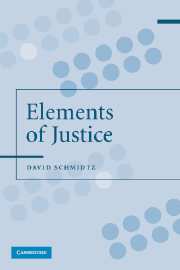Book contents
- Frontmatter
- Contents
- Acknowledgments
- PART 1 WHAT IS JUSTICE?
- 1 The Neighborhood of Justice
- 2 The Basic Concept
- 3 A Variety of Contestants
- 4 Contextual Functionalism
- 5 What Is Theory?
- PART 2 HOW TO DESERVE
- PART 3 HOW TO RECIPROCATE
- PART 4 EQUAL RESPECT AND EQUAL SHARES
- PART 5 MEDITATIONS ON NEED
- PART 6 THE RIGHT TO DISTRIBUTE
- References
- Index
2 - The Basic Concept
Published online by Cambridge University Press: 05 June 2012
- Frontmatter
- Contents
- Acknowledgments
- PART 1 WHAT IS JUSTICE?
- 1 The Neighborhood of Justice
- 2 The Basic Concept
- 3 A Variety of Contestants
- 4 Contextual Functionalism
- 5 What Is Theory?
- PART 2 HOW TO DESERVE
- PART 3 HOW TO RECIPROCATE
- PART 4 EQUAL RESPECT AND EQUAL SHARES
- PART 5 MEDITATIONS ON NEED
- PART 6 THE RIGHT TO DISTRIBUTE
- References
- Index
Summary
Thesis: Justice concerns what people are due. This much is uncontested, simply a matter of how we normally use the word. Exactly what people are due, though, cannot be settled entirely by conceptual analysis.
WHAT WE KNOW ABOUT THE BASIC CONCEPT
What is justice? It is a philosopher's question, and a philosopher might start by noting that when we ask what is justice, the term ‘justice’ is not a meaningless sound. We argue about justice, yet the very fact that we argue presupposes a level of mutual understanding. Because we share a language, we know we are not arguing about what is an eggplant, or what is the weather forecast, or what is the capital of Argentina. When we argue about justice, there may be much we do not know, but we know that justice has something to do with treating like cases alike.
We also know that treating like cases alike is not the whole of justice. Suppose a medieval king decrees that persons convicted of shoplifting shall have their left hand amputated. We protest. Such punishment is unjust! The king replies, “I don't play favorites. I treat like cases alike, so what's the problem?” Even if the king is telling the truth, this does not settle the matter. Amputating every thief's left hand is treating all alike, but evenhandedness (so to speak) is not enough. Impartiality is not enough. The idea of treating like cases alike is relevant, but there is more to justice than this.
- Type
- Chapter
- Information
- The Elements of Justice , pp. 7 - 12Publisher: Cambridge University PressPrint publication year: 2006



